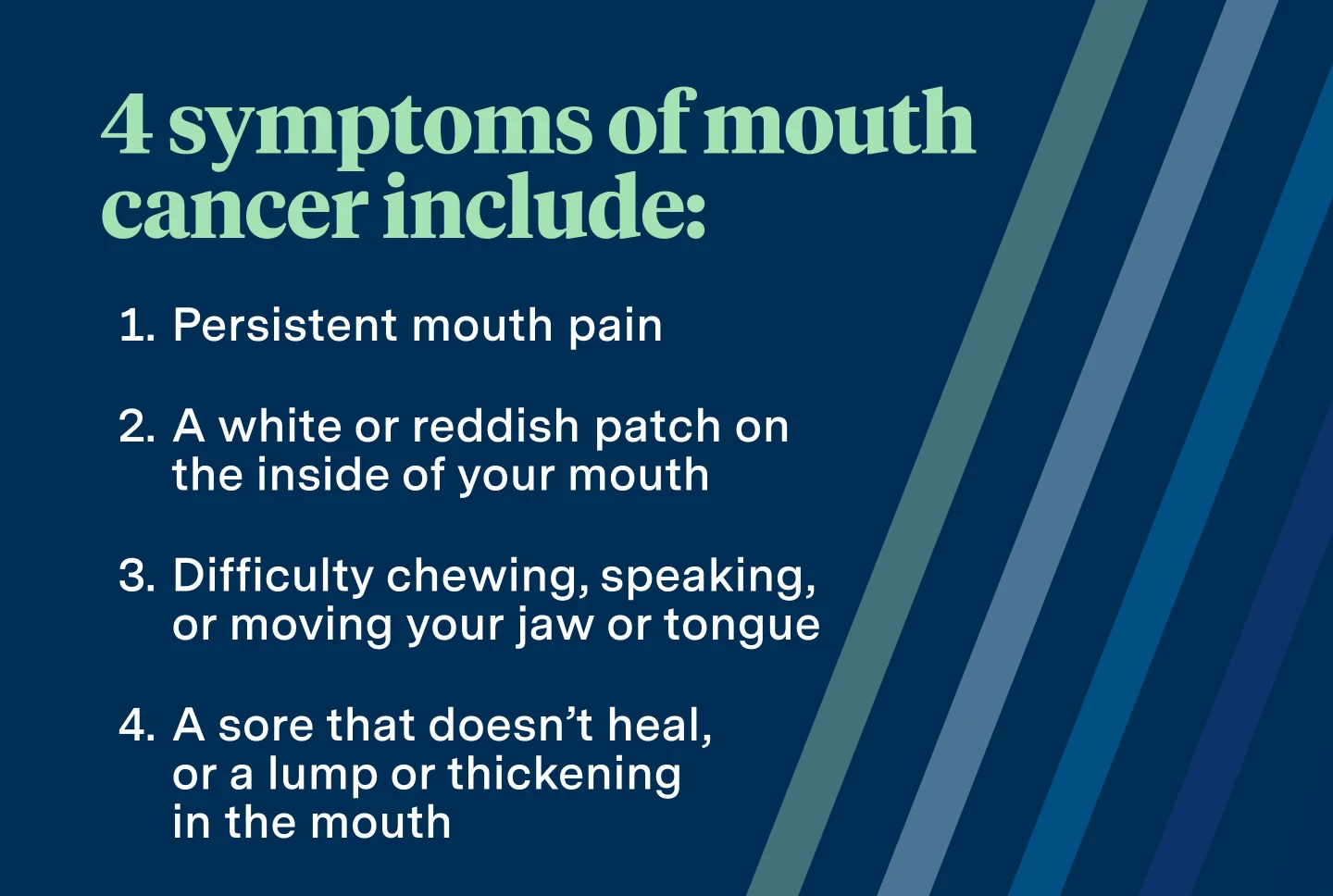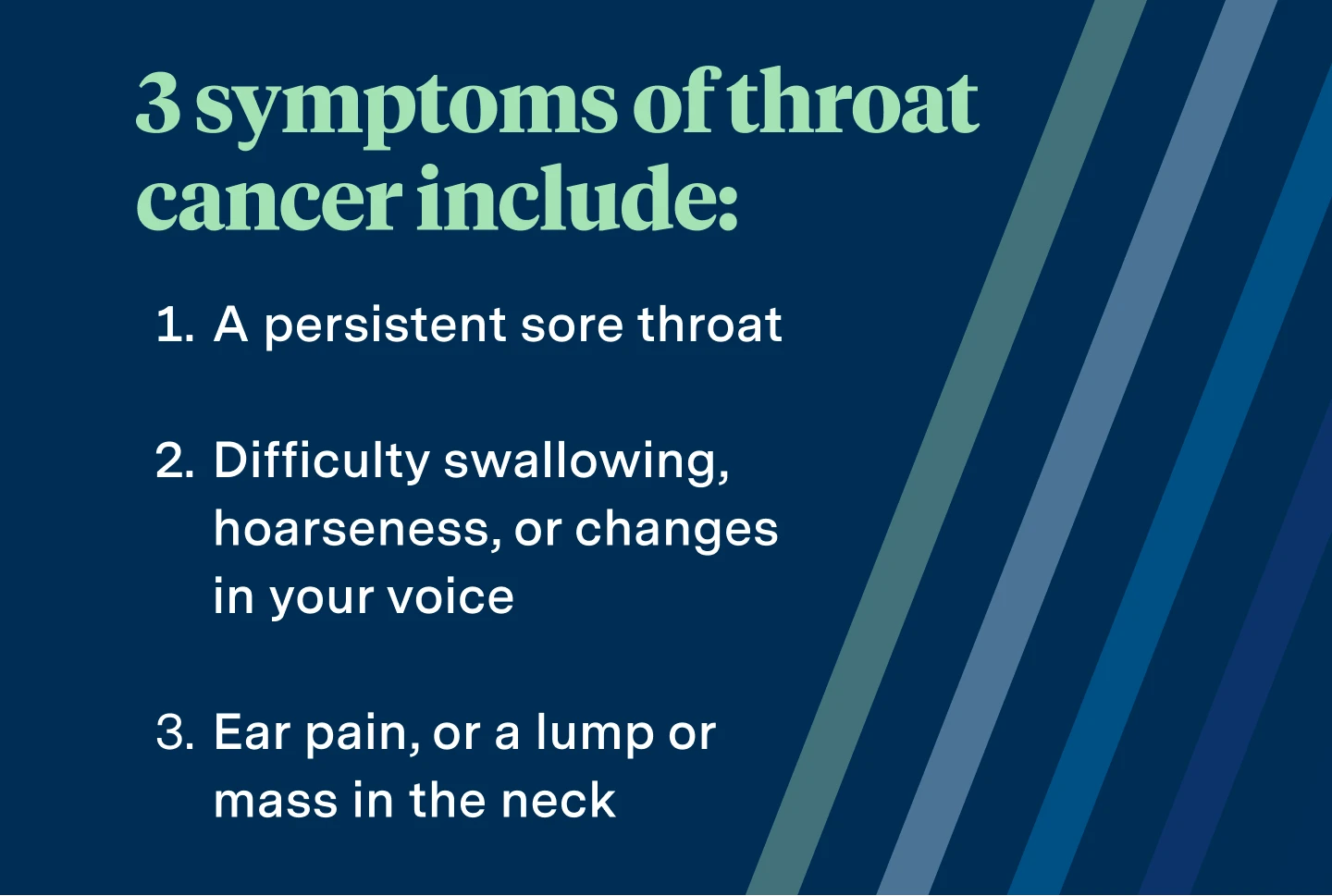Oral cancer
Oral cancer can affect the mouth or throat and impacts thousands of lives each year. Detect early signs by scheduling regular screenings with your Aspen Dental care team.
What is oral cancer?
Oral cancer refers to 2 types of cancer, mouth cancer and throat cancer. Although oral cancer is a concerning disease, when it’s detected early, it can be treated with success. Your Aspen Dental care team can guide you through effective prevention and recommendations on next steps to restore your health and smile.
As a precautionary measure, your Aspen Dental team will visually inspect your mouth and throat during each of your checkups for any signs of oral cancer. We also offer enhanced oral cancer screenings for your peace of mind.
Let’s take a look at oral cancer symptoms so you can stay on top of your oral health.
What are mouth and throat cancer symptoms?
Oral cancer symptoms can vary depending on their severity and location—either in the mouth or the throat.
Mouth cancer
Mouth cancer refers to cell mutation in areas of the mouth like the lips, gums, cheek lining, tongue, hard and soft palates, and the floor of the mouth.
Throat cancer
Throat cancer, also known as oropharyngeal cancer, refers to cell mutation in the pharynx. This is the hollow tube running from the nose down to the esophagus.
The most common type of throat cancer is squamous cell carcinoma, which develops in the tissues lining the throat.
If you experience any of the mouth cancer symptoms or throat cancer symptoms, contact your Aspen Dental dentist or doctor immediately.
Other possible symptoms include fatigue, unexplained weight loss, or changes in your bite.
What can cause oral cancer?
Tobacco use
Smoking cigarettes, cigars, pipes, or using smokeless tobacco
Excessive alcohol consumption
Regularly drinking large amounts of alcohol
Sun exposure
Prolonged exposure to the sun can increase the risk of developing lip cancer
HPV infection
Infection with the human papillomavirus (HPV)
Weakened immune system
People with weakened immune systems, such as those with HIV/AIDS
Poor oral hygiene
Poor dental hygiene and a diet low in fruits and vegetables
Age
Oral cancer is more common in people over 45
Gender
Men are twice as likely as women to develop oral cancer
What are my options for oral cancer treatments?
Care for oral cancer depends on its stage and location, as well as your overall health condition. These treatment options may be used alone, and some may be used in combination with other treatment options.

5 ways to treat oral cancer:
Surgery: The first-line treatment for oral cancer, surgery aims to remove the cancerous tissue and any affected lymph nodes.
Radiation therapy: Channels high-energy X-rays or other forms of radiation to kill cancer cells.
Chemotherapy: Uses drugs to kill active cancer cells.
Targeted therapy: Uses drugs to proactively target developing cancer cells while minimizing damage to healthy cells.
Immunotherapy: Activates the body’s immune system to fight cancer.
Your oral cancer care plan
Your doctor will work with you to determine the optimal care plan for your lifestyle and overall health needs.
It’s important to note that mouth cancer or throat cancer treatment may cause side effects, possibly impacting eating, speaking, or swallowing. To enhance recovery and quality of life, these side effects can be managed and supported with additional care like nutritional counseling, speech therapy, or physical therapy.
How do I identify oral cancer at home?
You can do a self-exam at home to help identify mouth or oropharyngeal cancer by looking for any unusual changes. Watch for lumps, bumps, sores, or red or white patches on your tongue or cheeks.
What are the stages of oral cancer?
Oral cancer typically follows a set of stages as the cancer progresses
Stage 0
Stage 1
Stage 2
Stage 3
Stage 4
Your questions about oral cancer answered
How do I prevent mouth and throat cancer?
Maintaining good oral hygiene is one of the most effective ways to prevent oral cancer.
Brushing your teeth twice a day, flossing daily, and using an anti-bacterial mouthwash can help remove the bacteria that can cause plaque build-up, which increases the risk of developing oral cancer.
If your lifestyle habits include smoking or drinking heavily, consider quitting to protect your health.
What do I need to know if I receive a diagnosis?
If your Aspen Dental care team detects any abnormalities, they will work with you to refer you to an oral surgeon, primary care physician or oncologist. At the time of receiving an oral cancer diagnosis, your external doctor will work with you to determine the best treatment for you. Afterward, your doctor will consult with your Aspen Dental dentist for any accompanying dental matters. It is likely your doctor will recommend chemotherapy or radiation to treat the cancer in a timely manner and prevent it from spreading.
What are the next steps after a diagnosis?
After an oral cancer diagnosis, it’s important to understand the different treatment options available to you. The most common treatments for oral cancer include surgery, radiation therapy, chemotherapy, targeted therapy and immunotherapy, explained in more detail above. Your doctor will work with you to determine the optimal care plan for your lifestyle and overall health needs. Our dental professionals can also work with you on short-term and long-term treatment for your teeth and gums, prevent cavity formation, and treat dry mouth. We will also continue to monitor your oral health with oral cancer screenings.
What are some side effects to oral cancer treatment?
It’s important to note that oral cancer treatment may cause side effects, possibly impacting eating, speaking, or swallowing. A few possible conditions include dry mouth and developing sores, increasing the risk of gum disease. To help ease these symptoms, Aspen Dental offers therapeutic oral health products, such as: dry mouth gel, prescription strength fluoridated toothpaste, MI paste, and alcohol-free wound healing rinses. Ask your dentist about any of these products to learn more. Additionally, to enhance recovery, oral cancer treatment side effects can be managed with additional care like nutritional counseling, speech therapy, or physical therapy.
How do I know when to get an oral cancer screening?
Early detection of oropharyngeal or mouth cancer is essential to successful treatment and recovery. It’s best to schedule an appointment at Aspen Dental for your routine checkup to get a thorough understanding of your oral health.
If you’re concerned about oral cancer, ask your local Aspen Dental dentist about our Enhanced Oral Cancer Screening. Our preferred screening tool is Oral ID, nearly all of our offices use Oral ID or a similar device using fluorescence technology.
Upon detection and confirmation of an oral cancer diagnosis, your Aspen Dental dentist will work closely with you to develop a personalized treatment plan.
Schedule your oral cancer screening today
Getting a holistic picture of oral health is essential for your overall health. Your Aspen Dental care team will be by your side, every step of the way, starting today.



